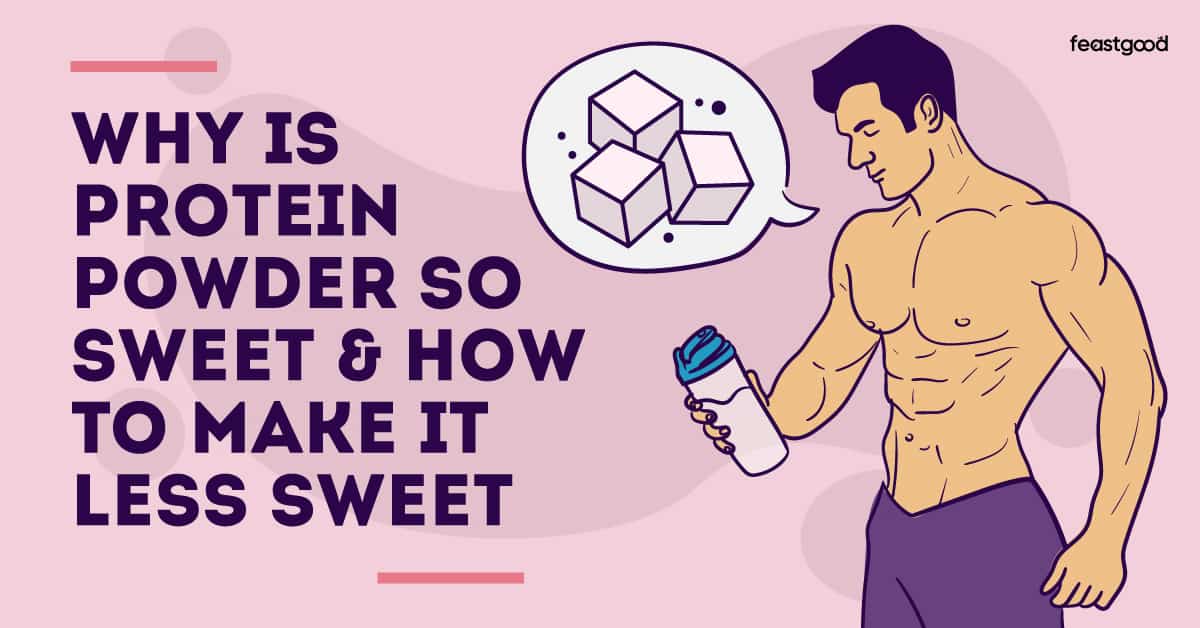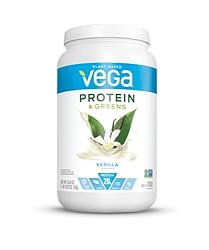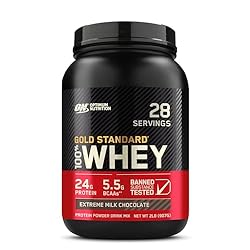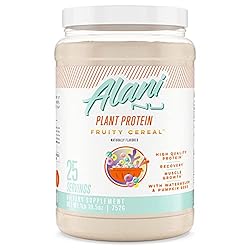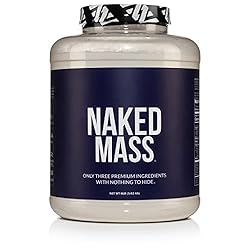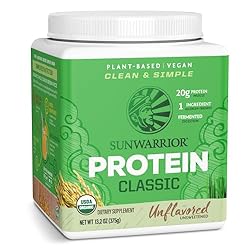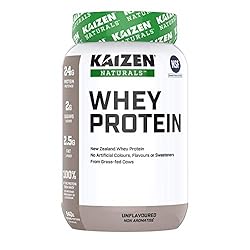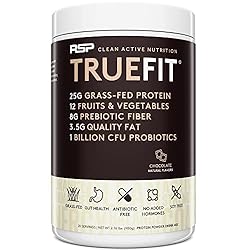Some links in this article are affiliate links, which means we earn from qualifying purchases. Learn more.
A common question I receive from clients about protein supplements is: Why is protein powder so sweet?
Simply put:
Protein powder is sweet because it includes artificial sweeteners (sucralose and acesulfame potassium) to help sweeten and create different flavors without adding additional calories.
Artificial sweeteners tend to be sweeter than regular (white) sugar, which is why protein powders may taste so sweet.
There are other reasons why your protein is sweet based on what you mix protein powder with, which I’ll discuss below. As well, I’ll discuss:
- Is protein powder full of sugar?
- What makes protein powder so sweet?
- Is sweet protein powder unhealthy for you?
- How do you make protein powder less sweet?
Is Protein Powder Full of Sugar?
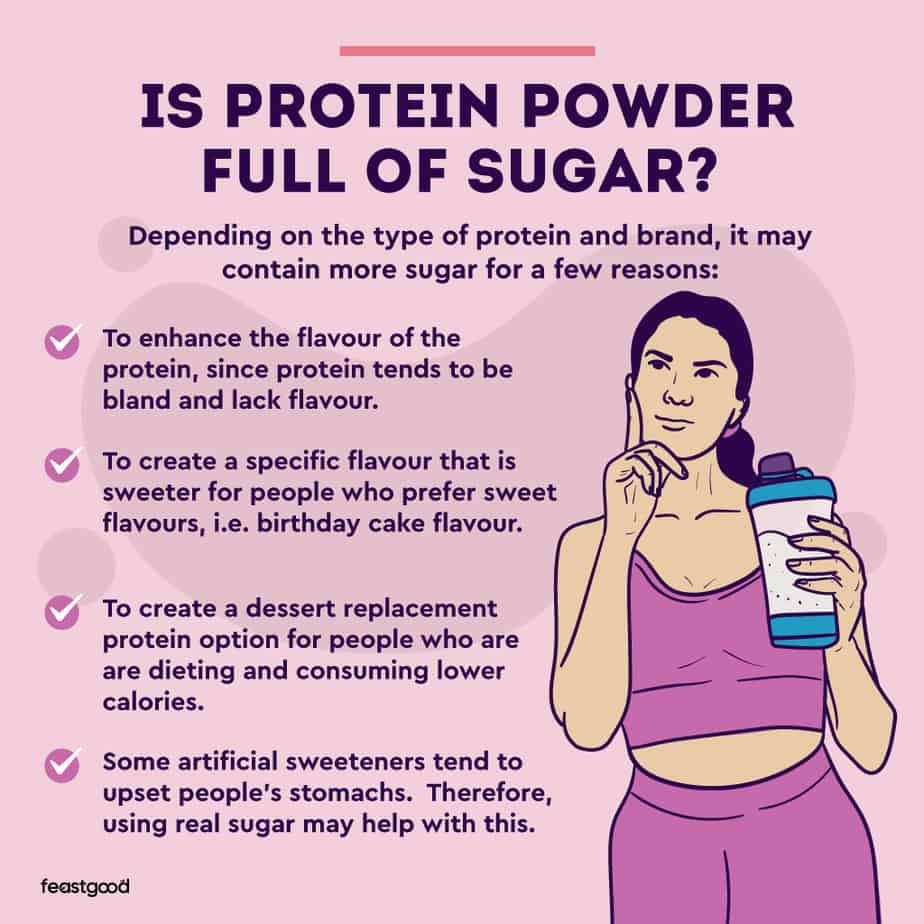
While most protein powder contains very little sugar (typically 1-2g per serving), if any, some do contain sugar in larger quantities.
Depending on the type of protein and brand, it may contain more sugar for a few reasons:
- To enhance the flavour of the protein, since protein tends to be bland and lack flavour.
- To create a specific flavour that is sweeter for people who prefer sweet flavours, i.e. birthday cake flavour.
- To create a dessert replacement protein option for people who are are dieting and consuming lower calories.
- Some artificial sweeteners tend to upset people’s stomachs. Therefore, using real sugar may help with this.
Two protein powders containing higher amounts of sugar are:
- Drink Wholesome: Some of Drink Wholesome’s flavors are advertised as using “real sugar” because they suggest artificial sweeteners are not stomach-friendly and can cause digestive upset.
- BSN Syntha-6: While BSN does have flavors without sugar, some of them do contain real sugar, including a lot of their “mass gainer protein shakes”. You’ll need to read the label in order to know the exact sugar content.
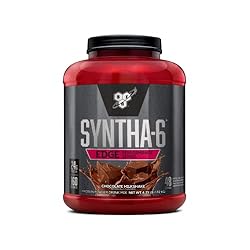
What Makes Protein Powder So Sweet?
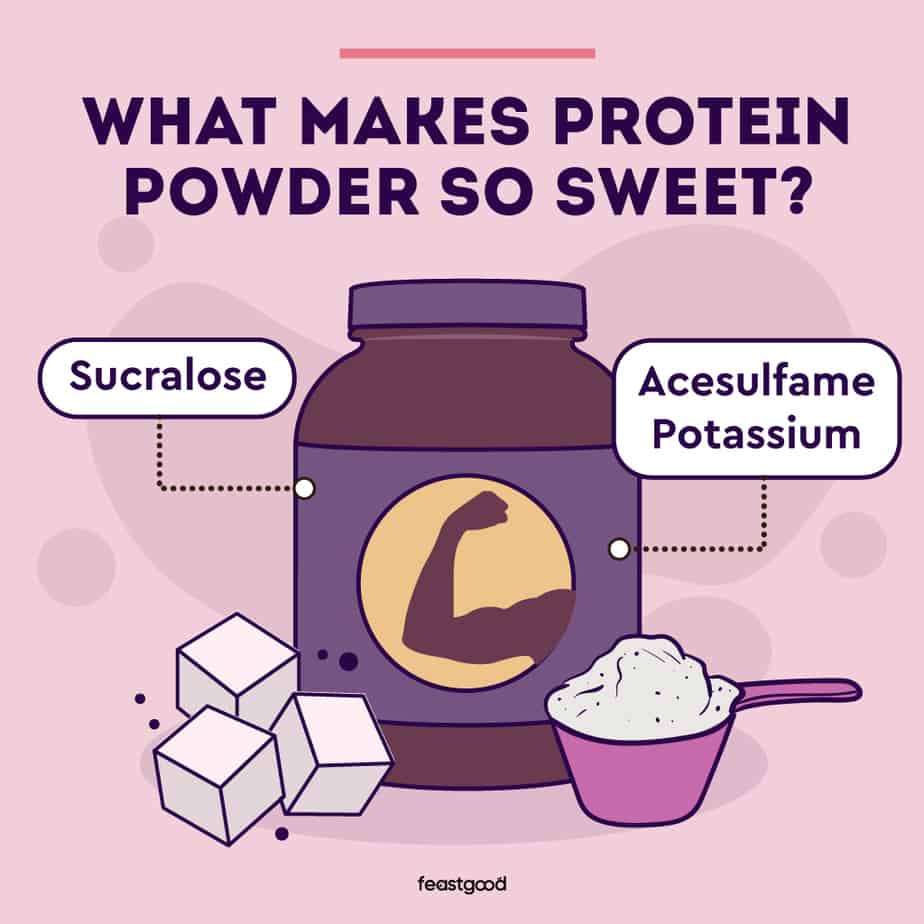
It’s important to recognize that even if your protein powder contains sugar, it doesn’t mean that it will be more sweet compared with protein powders that use artificial sweeteners.
In most cases, artificial sweeteners are significantly more sweet than sugar.
Here are two of the most common ingredients that could be causing your protein powder to be so sweet:
- Sucralose
- Acesulfame potassium
While there may be more artificial sweeteners in protein powder that you could see on the ingredient panel, these two are by far the most prominent.
Sucralose
Sucralose is an artificial sweetener commonly used in protein powder to sweeten the flavor of protein without the added calories.
Derived from table sugar, sucralose cannot be absorbed by the body. The undigested sucralose passes through the digestive system and is therefore considered a low-calorie sweetener option.
According to the Food & Drug Administration, sucralose is 600 times sweeter than regular sugar. This allows manufacturers to use less of it while still providing sweetness to the consumer.
Consuming protein powders with sucralose is a great alternative for those looking to cut back on the amount of added sugar they are consuming throughout the day for dietary preference or caloric restriction reasons.
But if you don’t like sweet options, then sucralose should be avoided.
- Related Article: How Many Calories Are In A Protein Shake? (9 Examples)
One of the common brand names for sucralose is Stevia.
Protein powders using Stevia as a sweetener:
Acesulfame Potassium
Acesulfame potassium, or acesulfame K or Ace-K, is also an artificial sweetener commonly used in a variety of foods and drinks. The reason? It keeps its flavor when heated. This is also another reason it is commonly found in baked goods.
As acesulfame potassium is also a non-calorie sweetener, it provides an option for both consumers and manufacturers to provide sweetness to the consumer without necessarily increasing the number of calories.
Some common food items where Ace-K is found include soft drinks, chewing gum, baked goods, yogurt, condiments, mouthwash, and toothpaste.
Compared to sucralose, it is not as sweet of an artificial sweetener. But, it is still 200 times sweeter than regular table sugar.
It also has a slightly bitter aftertaste, which is why it is commonly mixed with other sweeteners (you might see it paired with aspartame). So, don’t be surprised when you see Ace-K stacked with other sweeteners.
One of the common brand names for acesulfame potassium is Sweet One.
Protein powders using Ace-K as a sweetener:
- Related Article: Alani Nu Protein Powder Review: Our Verdict After Testing
Other Reasons Protein Powders Can Be Sweet
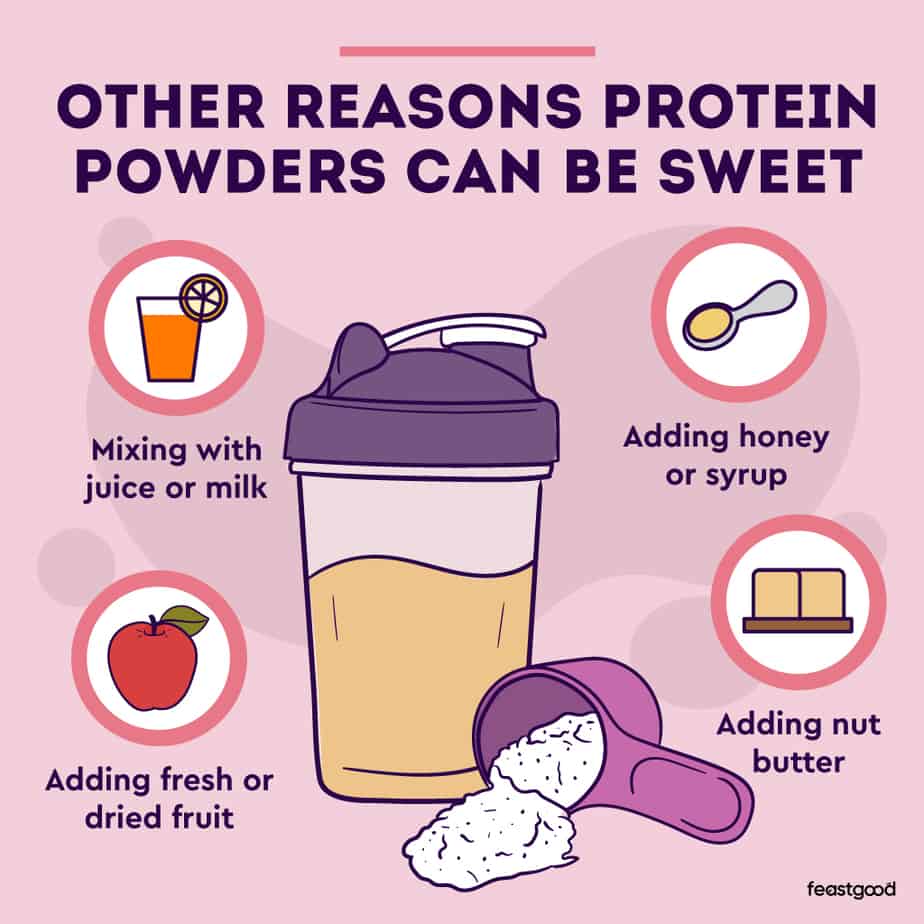
Protein powders enhanced with artificial sweeteners may prove to be sweeter than some of the non flavored or unsweetened flavors. However, it is not just artificial sweeteners that can make the taste of protein seem sweeter.
Some reasons for this include:
- Mixing with juice or milk
- Adding fresh or dried fruit
- Adding honey or syrup
- Adding nut butter
Mixing With Juice or Milk
When making a protein shake, check the liquid that you are using to mix the powder with.
If you are using water, this will not apply to you. However, if you find yourself using cow’s milk, sweetened plant-based milk, or even juice to mix your protein powder with, this could be adding to the sweetness of the protein.
Adding Fresh, Frozen or Dried Fruit
If you tend to add fruit, be sure to check the type you are using.
As fresh fruit doesn’t include any added sugars or sweeteners, sometimes dried, frozen or packaged fruit does. These sweeteners will play into the sweetness levels of the protein too.
Adding Honey or Syrup
Adding honey or another natural syrup like maple syrup or agave syrup as an alternative for an artificial sweetener or table sugar is common.
It is important to keep in mind that if you are using a protein powder with sweeteners in them, this will enhance the level of sweetness that you are already receiving from the powder.
Adding Nut Butter
It is common to add nut butter to smoothies in hopes of not only increasing the amount of protein but also the number of healthy fats being consumed in a day.
Not all nut butter have added sweeteners but some do. It is important to be mindful of the ingredients on the nut butter when adding to your smoothie if you are looking to not increase the level of sweetness more than what is already present in the protein powder.
- To learn more, check out Protein Bars vs. Shakes: Pros, Cons, & Which Is Best?
Is Sweet Protein Powder Unhealthy For You?
No, sweet protein powder is not unhealthy for you. Instead, it comes down to personal preference or dietary restriction if you should and can consume these types of protein powders.
The U.S. Food and Drug Administration created a running list of additives to foods that are safe for consumption. All of the sweeteners that are commonly found in protein powders are on this list.
Although there are many rumors that artificial sweeteners are linked to cancer and other diseases, it is important to note that many of these studies fail to show the link between cause and effect between the consumption of artificial sweeteners and that being the sole cause of cancer in an individual.
Hence why they have been deemed safe by the FDA for human consumption.
With anything, moderation is key. Utilizing protein powder as a supplement is key. It should not be the only source of protein in your diet.
A general rule of thumb is to not exceed 2 servings of protein powder each day.
Focusing on a variety of protein sources will not only help to provide your body with adequate natural sources of protein but also micronutrients that your body requires on a daily basis in addition to protein, fats, and carbohydrates.
How Do You Make Protein Powder Less Sweet?
If you are looking to cut back on the sweetness of protein powder, here are some options for you:
Choose Unflavored Protein Powder Instead
As not every person enjoys the flavor of sweetness, specifically artificial sweeteners, there are options for you to choose an unflavoured protein powder.
Some examples of this include:
Choose Protein Powders Without Certain Ingredients
Try to avoid protein powders with added artificial sweeteners when possible if you are looking to cut the sweetness.
As most flavors include these, you’ll want to read the ingredient lists closely.
Some options without sucralose include:
Avoid Certain Add-Ons
When making a smoothie, consider the add-ons you are putting in and how they may affect the level of sweetness you are getting.
Adding in sweeter fruits such as bananas, mangos, peaches, and dragonfruit may sweeten the flavor of the protein shake.
Other add-ons like honey, agave syrup, or maple syrup will also sweeten the shake as well.
If you are already using a sweet-tasting protein powder, you may want to limit or eliminate some of these add-ons and replace them with more subtle fruits like strawberries or even vegetables like carrots, spinach, or cauliflower.
Avoid Flavors That Sound Sweet
When choosing a flavor of protein, choose an unflavoured protein or avoid flavors that simply sound sweet.
You may find a Classic Vanilla is not as sweet as a Vanilla Milkshake flavor (click to learn how to make vanilla protein powder taste better). As well, choosing a Classic Chocolate compared to a Triple Chocolate Delight flavor may help to be a more subtle flavor.
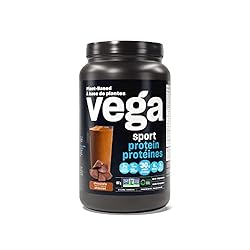
Avoid Ready Made Or Meal Replacement Shakes
As convenient as ready-made or replacement shakes can be when you are on the go, be mindful that these tend to include a higher volume of sugar in order to increase the sweetness and make the shake more palatable and also to increase the number of carbs in the shake.
Related Article: Are Ready-Made Protein Shakes Good For You?
Other Protein Powder Resources
- Does Protein Powder Have Caffiene? (30+ Brands Inspected)
- Can Teenagers Take Protein Powder? (What The Science Says)
- Does Protein Powder Have Carbs? 8 Types of Protein Explained
- How To Make Chocolate Protein Shakes Taste Better
Reference
Lim U, Subar AF, Mouw T, Hartge P, Morton LM, Stolzenberg-Solomon R, Campbell D, Hollenbeck AR, Schatzkin A. Consumption of aspartame-containing beverages and incidence of hematopoietic and brain malignancies. Cancer Epidemiol Biomarkers Prev. 2006 Sep;15(9):1654-9. doi: 10.1158/1055-9965.EPI-06-0203. PMID: 16985027.
About The Author

Caryn Watt is a certified personal trainer & nutrition coach. Working primarily with women all over the world, she focuses her time on helping clients learn more about nutrition and the importance of improving their relationship with food through tracking macros, movement, and mindfulness.
Why Trust Our Content

On Staff at FeastGood.com, we have Registered Dietitians, coaches with PhDs in Human Nutrition, and internationally ranked athletes who contribute to our editorial process. This includes research, writing, editing, fact-checking, and product testing/reviews. At a bare minimum, all authors must be certified nutrition coaches by either the National Academy of Sports Medicine, International Sport Sciences Association, or Precision Nutrition. Learn more about our team here.
Have a Question?
If you have any questions or feedback about what you’ve read, you can reach out to us at [email protected]. We respond to every email within 1 business day.
